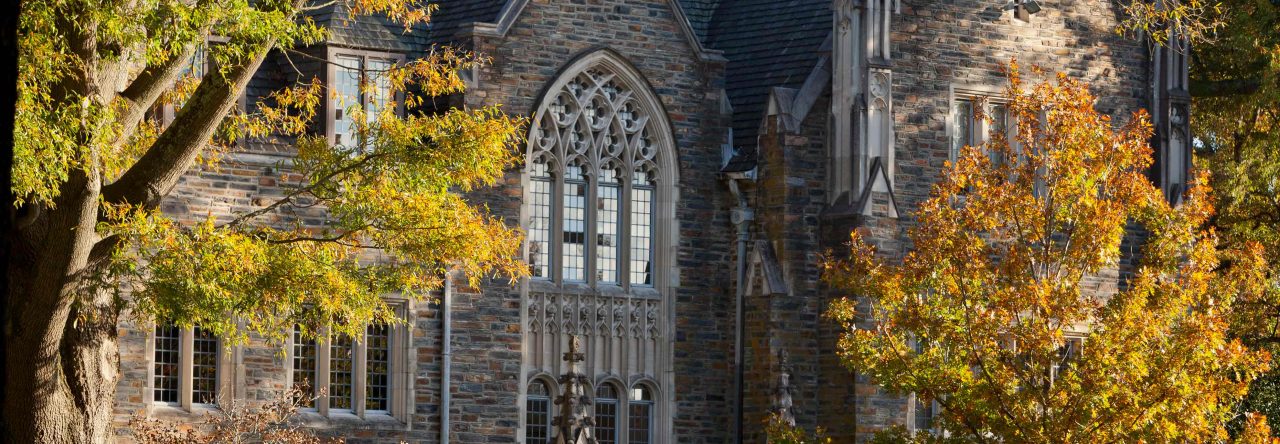To the Duke Community,
I am writing today with an update on the Duke Climate Commitment, the university-wide initiative launched last September to harness Duke’s extraordinary strengths and resources toward the goal of addressing climate change.
Duke is in a unique position to deliver solutions that will place society on a path to a more resilient, sustainable, equitable, and healthy future, and the Climate Commitment offers us a new model for collaborative action. As highlighted today in stories from across the university, we seek to unify our efforts and amplify interdisciplinary climate and sustainability work, offering every member of the Duke community an opportunity to engage in these efforts. I am very grateful to Stanback Dean of the Nicholas School of the Environment Toddi Steelman, Interim Director of the Nicholas Institute for Energy, Environment and Sustainability Brian Murray, and Executive Director of Climate and Sustainability Tavey Capps for their leadership.
Today, I am pleased to announce specific, measurable commitments on climate, embedded into the five areas of Duke’s strategic framework: empowering the boldest thinkers, transforming teaching and learning, renewing our campus community, forging purposeful partnerships in Durham and the region, and engaging our extraordinary global network.
As we empower the boldest thinkers, we commit to
- expand and further refine our climate research in four core areas—energy transformation, climate and community resilience, data-driven climate solutions, and environmental and climate justice;
- support research projects related to climate through new initiatives, including the Climate Research Innovation Seed Program (CRISP), University-Wide Collaboration Grants on Climate Change, and Data Expeditions;
- engage faculty, students, and staff from across the university to foster new collaborative and interdisciplinary research connections.
As we transform teaching and learning, we commit to
- build on the success of UNIV102 and partner with schools across the university to infuse climate and sustainability into educational programs, preparing Duke students to lead in the 21st century;
- launch a teaching fellows program to support instructors in incorporating climate and sustainability in their courses;
- offer workshops to students, faculty, and staff to deepen their knowledge and agency on issues related to climate and sustainability;
- explore resource needs for career services to better prepare students for entering the workforce with the goal of contributing to climate change solutions;
- expand the Campus as Lab program to use Duke’s campus as a living laboratory.
As we renew our campus community, we commit to
- continue progress towards Duke’s goals for carbon neutrality, outlined in the 2019 Climate Action Plan Update.
- build on the 43% greenhouse gas emissions reductions to date as we navigate challenges from the pandemic, with a focus on campus energy efficiency, off-campus solar, renewable natural gas, and opportunities to retain the significant emission reductions realized in employee commuting and air travel over the past two years;
- continue to work with a staff, faculty and student advisory committee to evaluate potential carbon offsets projects that meet our high standards;
- seek new opportunities to directly engage staff in Duke’s sustainability efforts, including through workshops, workplace certifications, and educational resources;
- develop a Duke Sustainable Fleet and Electric Vehicle (EV) Charging Plan to reduce the impact of campus vehicles and expand EV infrastructure;
- continue working with DUMAC to support endowment investments in sustainability, in accordance with the Guideline on Investment Responsibility adopted by the Board of Trustees;
- expand efforts to infuse sustainability further into Duke’s supply chain through campus policies and contract language;
- explore opportunities to support and increase sustainability efforts in the Duke Health system.
As we partner with purpose in Durham and the region, we commit to
- strengthen our relationship with the City of Durham and promote regional sustainability through the Strategic Community Impact Plandeveloped by the Office of Durham and Community Affairs;
- engage local, state, and federal policymakers regarding equitable climate and sustainability solutions;
- deepen our involvement with green entrepreneurs, investors, and industry leaders in the Research Triangle and beyond.
As we engage our global network of alumni, we commit to
- convene climate leaders on campus to share their work and engage with the Duke community, including these events in Spring 2023, among others:
Sustainable Business and Social Impact conference,
Blue Economy Summit, hosted by Oceans@Duke,
Climate Change, Decolonization, and Global Blackness series at the John Hope Franklin Humanities Institute, and
Histories and Society in the Hydrosphere conference, hosted by the Center for International and Global Studies;
- develop opportunities for alumni who are invested in climate and sustainability work to connect with our education, research and engagement efforts on campus and beyond;
- provide climate and sustainability literacy and fluency opportunities for alumni through lifelong learning and digital education partnerships.
Over the coming months and years, we will track our progress on these commitments on the Climate Commitment website. We recognize that this initiative may evolve and will take time to implement, and we will only succeed through the collective action of our students, faculty, staff, alumni, and friends.
These commitments are both aspirational and inclusive. They allow us to think about the kind of university we want Duke to be. I invite you personally to be a part of this important effort.
The Duke Climate Commitment marks a hopeful moment—when we seize the opportunity to lead toward a brighter future. I hope you will join me in this transformational undertaking.
Together, Duke is in it for life.
Cheers,
Vince
